IDAS Series: Reflections from Moscow and Lessons from Ukraine
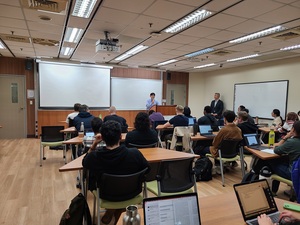
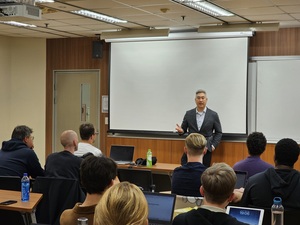
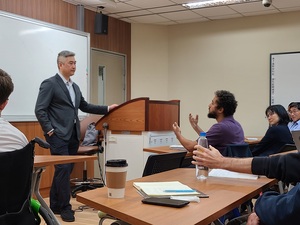
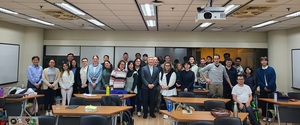
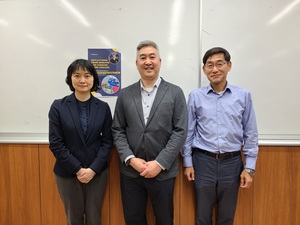
Date :
2024-03-25
Department :
International Doctoral Program in Asia-Pacific Studies
【Article by IDAS】
National Chengchi University’s (NCCU) International Doctoral Program on Asia-Pacific Studies (IDAS) lecture series presented Reflections from Moscow and Lessons from Ukraine, held on 13 March 2024. A discussion presented by Rear Admiral (rtd) Philip W. Yu of the United States Navy, former defense attaché to Russia and served as division chief for Northeast Asia Policy at U.S. Indo-Pacific Command.
RAdm. Yu’s talk drew significant parallels between Russia’s action prior to its invasion of Ukraine in February 2022 with the ongoing acts of the People’s Republic of China (PRC) toward Taiwan, currently. In his view, many of Russia’s playbook in the building up to its invasion are observable in the development of the PRC’s own actions around Taiwan. As both Vladimir Putin and Xi Jinping, respectively, have taken steps for the centralization of the decision-making process and isolation of their economies, coinciding with building up their foreign reserves. Another indicator would be the decimation of civil society and the increasing oversight of the government on freedom of the press, with the suppression of dissidents through legal coercion.
Furthermore, the amassing of Russian troops and ammunition near the Ukrainian border under the pretense of military exercises or law enforcement activities was a clear harbinger of what was to come. RAdm. Yu connected these similarities with the PRC’s effort to change the situation around Kinmen Island following incidents in early March 2024. These are only the most recent efforts to change the status quo.
At the end of his discussion, RAdm. Yu focused on mitigating countermeasures, emphasizing the effective use of intelligence gathering and sharing. He pointed to the US efforts prior to the invitations of Ukraine in sharing classified intelligence with the world to expose Russian intention and its false flag actions. He noted that open-source intelligence is the best way of exposing scrupulous actions.
In the open forum, a multitude of topics were discussed, with the question of economic interdependence as a sufficient deterrence for conflict. RAdm. Yu's response pointed to the fact that before the invasion many U.S. companies were in Russia, with Russia integrated into the global economy. But the decision to go to war with Ukraine was not based on economics. Another repeated point of inquiry was the concept of day-to-day resilience, RAdm. Yu advised spending the money now to enhance deterrence capabilities. This calls for decentralization of energy storage and supply to retain resilience. He emphasized that in the early stages of a conflict, it is important to have the ability to communicate to the people that the government is still in control. Furthermore, as most daily functions are civilian functions, private industry has to step up. He added that part of this resilience strategy is the need for a diplomatic effort before the start of hostilities to establish accords with other states to assist Taiwan. In conclusion, he pointed to the fact that the act of negotiation is best done on an even playing field. It would serve Taiwan to maintain its capabilities to resist coercion.
It was our honor to have Rear Admiral (rtd) Philip W. Yu for this discussion on the lessons that could be learned from the Russian-Ukrainian war and their applicability to Taiwan’s own situation. The talk attracted a diverse audience of both local and international scholars and students, which sparked participation in the discussion session. It was also a great chance for our students to further understand the overlapping circumstances of Taiwan and Ukraine from first-hand resources. IDAS continues to arrange lectures focusing on issues integral to the Asia-Pacific region.
National Chengchi University’s (NCCU) International Doctoral Program on Asia-Pacific Studies (IDAS) lecture series presented Reflections from Moscow and Lessons from Ukraine, held on 13 March 2024. A discussion presented by Rear Admiral (rtd) Philip W. Yu of the United States Navy, former defense attaché to Russia and served as division chief for Northeast Asia Policy at U.S. Indo-Pacific Command.
RAdm. Yu’s talk drew significant parallels between Russia’s action prior to its invasion of Ukraine in February 2022 with the ongoing acts of the People’s Republic of China (PRC) toward Taiwan, currently. In his view, many of Russia’s playbook in the building up to its invasion are observable in the development of the PRC’s own actions around Taiwan. As both Vladimir Putin and Xi Jinping, respectively, have taken steps for the centralization of the decision-making process and isolation of their economies, coinciding with building up their foreign reserves. Another indicator would be the decimation of civil society and the increasing oversight of the government on freedom of the press, with the suppression of dissidents through legal coercion.
Furthermore, the amassing of Russian troops and ammunition near the Ukrainian border under the pretense of military exercises or law enforcement activities was a clear harbinger of what was to come. RAdm. Yu connected these similarities with the PRC’s effort to change the situation around Kinmen Island following incidents in early March 2024. These are only the most recent efforts to change the status quo.
At the end of his discussion, RAdm. Yu focused on mitigating countermeasures, emphasizing the effective use of intelligence gathering and sharing. He pointed to the US efforts prior to the invitations of Ukraine in sharing classified intelligence with the world to expose Russian intention and its false flag actions. He noted that open-source intelligence is the best way of exposing scrupulous actions.
In the open forum, a multitude of topics were discussed, with the question of economic interdependence as a sufficient deterrence for conflict. RAdm. Yu's response pointed to the fact that before the invasion many U.S. companies were in Russia, with Russia integrated into the global economy. But the decision to go to war with Ukraine was not based on economics. Another repeated point of inquiry was the concept of day-to-day resilience, RAdm. Yu advised spending the money now to enhance deterrence capabilities. This calls for decentralization of energy storage and supply to retain resilience. He emphasized that in the early stages of a conflict, it is important to have the ability to communicate to the people that the government is still in control. Furthermore, as most daily functions are civilian functions, private industry has to step up. He added that part of this resilience strategy is the need for a diplomatic effort before the start of hostilities to establish accords with other states to assist Taiwan. In conclusion, he pointed to the fact that the act of negotiation is best done on an even playing field. It would serve Taiwan to maintain its capabilities to resist coercion.
It was our honor to have Rear Admiral (rtd) Philip W. Yu for this discussion on the lessons that could be learned from the Russian-Ukrainian war and their applicability to Taiwan’s own situation. The talk attracted a diverse audience of both local and international scholars and students, which sparked participation in the discussion session. It was also a great chance for our students to further understand the overlapping circumstances of Taiwan and Ukraine from first-hand resources. IDAS continues to arrange lectures focusing on issues integral to the Asia-Pacific region.


 Fax:886-2-29379611
Fax:886-2-29379611